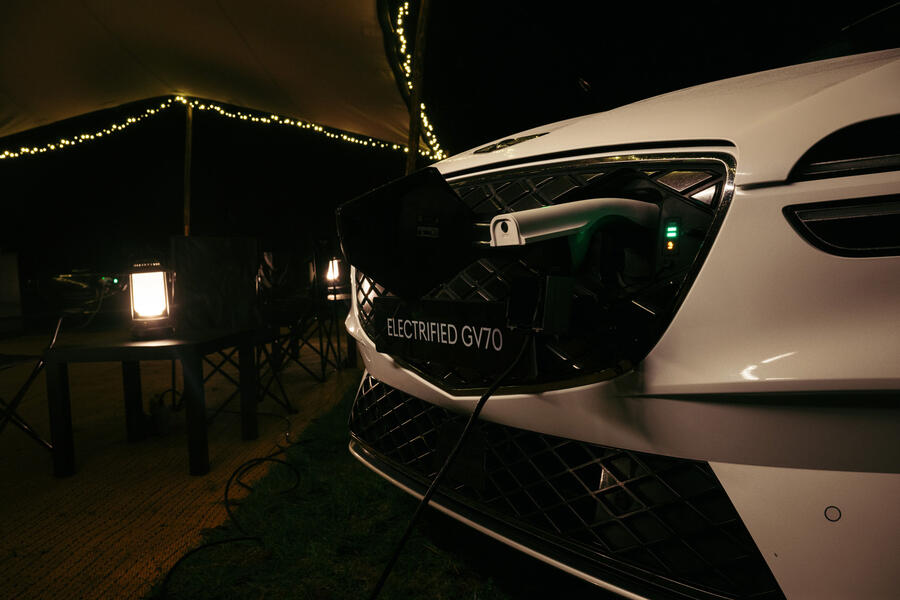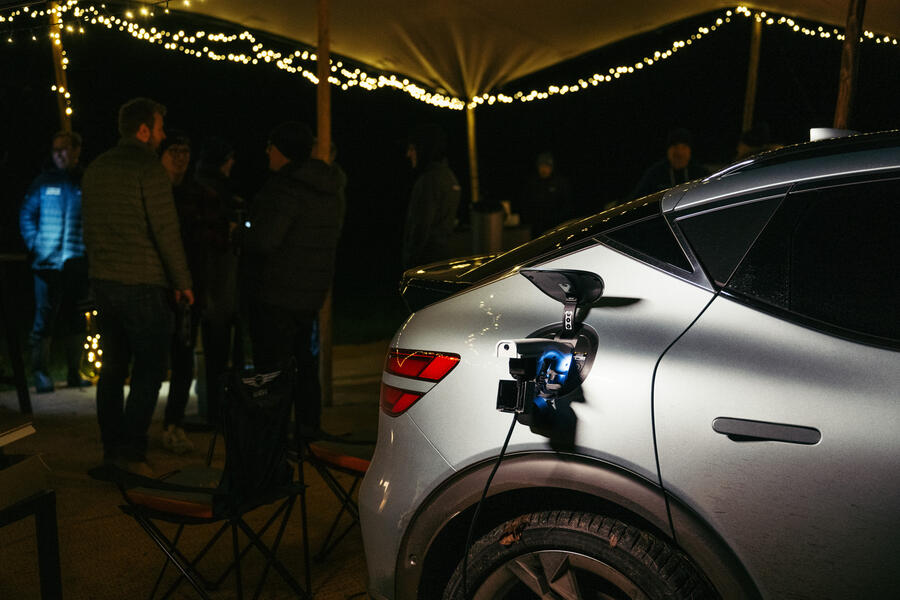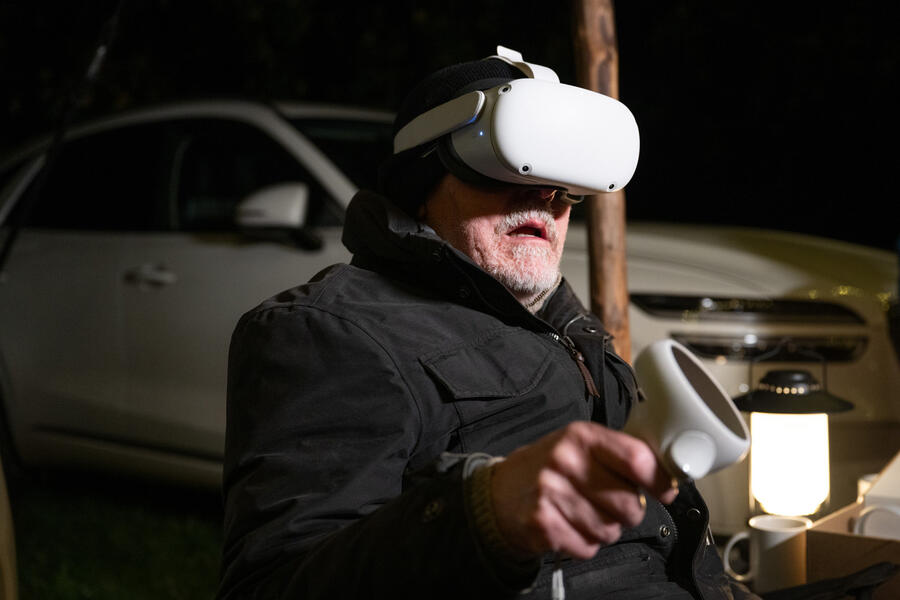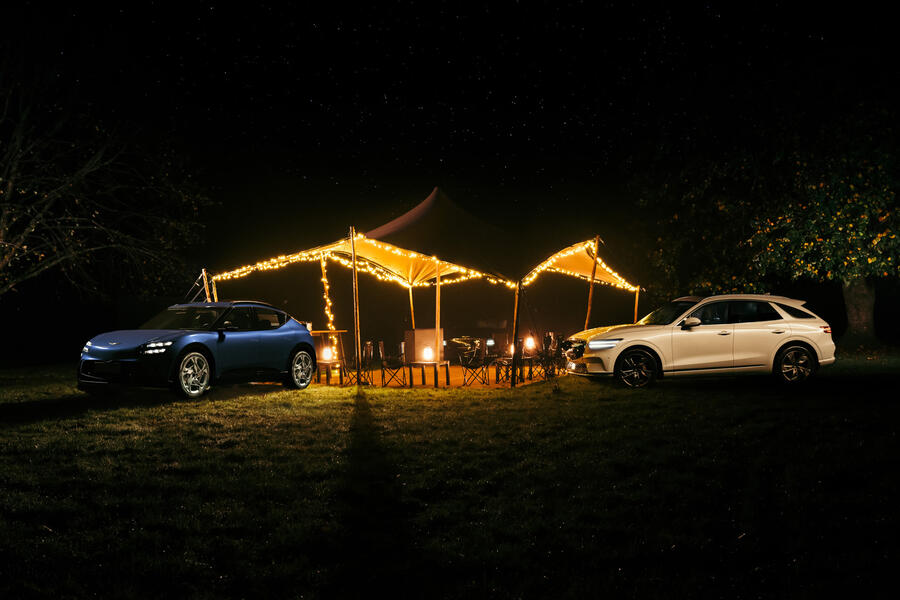Genesis says power flows both ways. On a stargazing trip to Exmoor, we find out how useful our cars might soon be
Power cuts can be really annoying, especially given how much of our lives are now dependent on devices that ultimately draw energy from a plug. But they’re no problem at all if you have a Genesis GV60, Electrified GV70 or Electrified G80.
These models are among a slowly growing number of electric vehicles with V2L (vehicle-to-load) capability, a system that converts the DC current used by the car’s traction battery to AC to power something external. Handy.
To access the AC current, you plug a dedicated adapter into the car’s charging port and, into its other end, a gang extension socket into which you plug your devices or appliances.
The V2L system does the rest. On Genesis models, the system will support a 3.68kW charge – higher than the power supply in the average home and more than enough to power a plug-in oven, a microwave, an airfryer, a flat-screen TV and charge up all your devices.

To show what’s possible with V2L, Genesis invited Autocar to come stargazing on Exmoor one cold November night.
The national park is recognised by the International Dark Sky Association as one of the places in the UK with the darkest skies. However, while Genesis knows a thing or two about cars, it knows next to nothing about stars, so invited Mark Thompson of BBC Stargazing Live, to guide the magazine’s exploration of the solar system.
To keep us warm and refreshed, it also arranged for some Electrified GV70s to be in attendance, powering an array of camp lights and appliances that included a coffee machine, kettles and – very welcome, these – seat warmers.
In fact, for owners of the few EVs currently with V2L capability, powering an outdoor location or a campsite like this is how they’re most likely to use the system.

Other potential applications include recharging off-road e-bikes or remote control gadgets, running power tools or even powering a boot sale stand. The possibilities are endless but, alas, not without cost.
For example, the GV70’s V2L adapter costs a cool £880. In addition to selected Genesis models, other EVs with V2L include the Kia EV9, while both the Volvo EX90 and Polestar 4 are expected to have it soon.
But back to the stargazing. I’d like to say that with Thompson’s help, we saw a dizzying display, but unfortunately, a thick blanket of low clouds obscured Exmoor’s night sky.
No matter; instead we were given virtual reality headsets to wear, which, wherever we turned our heads, displayed a representation of the night sky in all its celestial glory.

Wearing his own headset, Thompson talked us through the heavens but being a humble motoring scribe with old sump oil sloshing between my ears, all I can remember is that our atmosphere is what makes stars appear to twinkle, thanks to its low density, Saturn could float on water, Mars has polar caps of CO₂ and a cow was once killed by a meteorite.
Breathtaking stuff but, frankly, more impressive was the fact that these astonishing tidbits were shared in a remote camp powered not by a noisy and malodorous diesel generator but by a couple of electric cars silently dispensing electrons.
The GV70’s ability to both draw power and dispense it is known as bi-directional charging. We have covered V2L, but another emerging application is V2H, or vehicle-to-home.
This involves an EV, which must have V2H capability, discharging its electricity – ideally generated for free by solar or drawn overnight on a low-rate tariff such as Intelligent Octopus Go – to your home. It does this via a bi-directional smart home charger and other items of electrical equipment including a CT (current transformer) meter installed at the main grid connection point.
To power it for two days, the typical home requires 40kWh of electricity or a little more than half the capacity of a Genesis Electrified GV70’s 77.4kWh battery.

Considering that, according to the RAC Foundation, the average car is driven for just 4% of the time, it follows that there is huge scope for EVs being used as sources of cheaper domestic energy. Models with V2H capability include the Kia EV9, Polestar 3 and Renault 5.
Another emerging application is V2G, or vehicle to grid. This enables an EV to send its energy back to the national grid. You charge the battery when the electricity is cheap and then, using the car’s V2G system, sell it back to the national grid when unit prices are high, such as in the evening when everyone’s cooking tea.
V2G is very new and among the few tariffs currently available is Octopus Power Pack. EVs with V2G again include the Kia EV9, Polestar 3 and Renault 5 E-Tech. Although the Volvo EX90 has V2L, V2H and V2G capability, all three systems (together called V2X) are not yet activated but will be, over the air, sometime in 2025.
But back to the stars. Other things we learned at the Genesis camp that cloudy evening were that light from Jupiter takes 35 minutes to reach us, but from Andromeda 2.5 million years, and were you so disposed, you could fit all of our planets inside Jupiter.
I don’t know about you but I reckon that, on the “well I never” scale, those few nuggets aren’t quite as impressive as the fact that using V2L, a Genesis GV70 can make a delicious mug of cocoa in three minutes.
Source: Autocar
